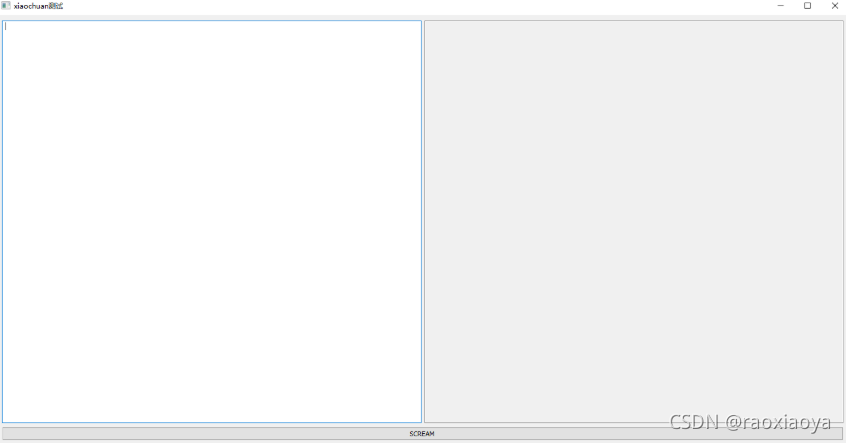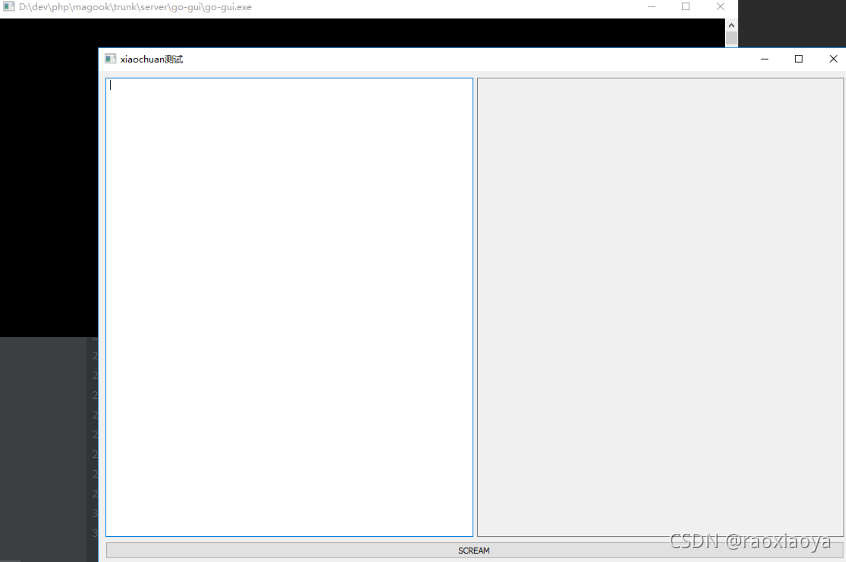轻松入门:使用Golang开发跨平台GUI应用
作者:raoxiaoya
基础操作
requires:Go 1.11.x or later
安装依赖
go get github.com/lxn/walk go get github.com/akavel/rsrc rsrc
创建文件 go-gui/gui.go
package main
import (
"strings"
"github.com/lxn/walk"
. "github.com/lxn/walk/declarative"
)
func main() {
var inTE, outTE *walk.TextEdit
MainWindow{
Title: "xiaochuan测试",
MinSize: Size{600, 400},
Layout: VBox{},
Children: []Widget{
HSplitter{
Children: []Widget{
TextEdit{AssignTo: &inTE, MaxLength: 10},
TextEdit{AssignTo: &outTE, ReadOnly: true},
},
},
PushButton{
Text: "SCREAM",
OnClicked: func() {
outTE.SetText(strings.ToUpper(inTE.Text()))
},
},
},
}.Run()
}go mod init go-gui
创建后缀为manifest的文件
go-gui/go-gui.exe.manifest
<?xml version="1.0" encoding="UTF-8" standalone="yes"?>
<assembly xmlns="urn:schemas-microsoft-com:asm.v1" manifestVersion="1.0">
<assemblyIdentity version="1.0.0.0" processorArchitecture="*" name="SomeFunkyNameHere" type="win32"/>
<dependency>
<dependentAssembly>
<assemblyIdentity type="win32" name="Microsoft.Windows.Common-Controls" version="6.0.0.0" processorArchitecture="*" publicKeyToken="6595b64144ccf1df" language="*"/>
</dependentAssembly>
</dependency>
<application xmlns="urn:schemas-microsoft-com:asm.v3">
<windowsSettings>
<dpiAwareness xmlns="http://schemas.microsoft.com/SMI/2016/WindowsSettings">PerMonitorV2, PerMonitor</dpiAwareness>
<dpiAware xmlns="http://schemas.microsoft.com/SMI/2005/WindowsSettings">True</dpiAware>
</windowsSettings>
</application>
</assembly>rsrc -manifest go-gui.exe.manifest -o rsrc.syso go build -ldflags="-H windowsgui"
双击 go-gui.exe

文件go-gui.exe可以复制到任何地方直接运行,因为已经将manifest文件编译进去了。
添加图标
rsrc -manifest go-gui.exe.manifest -ico favicon.ico -o rsrc.syso go build -ldflags="-H windowsgui"
favicon.ico为下载的图标文件,效果如下。

运行程序,任务栏上的图标也变成了这个。
具体说明
1、manifest 文件
这个东西的作用就是为了解决 以前windows上的“Dll 地狱” 问题才产生的新的DLL管理解决方案。大家知道,Dll是动态加载共享库,同一个Dll可能被多个程序所使用,而所谓“Dll 地狱”就是当不通程序依赖的Dll相同,但版本不同时,由于系统不能分辨到底哪个是哪个,所以加载错了Dll版本,然后就挂了。于是盖茨就吸取了教训,搞了一个程序集清单的东西,每个程序都要有一个清单,这个清单存再和自己应用程序同名的.manifest文件中,里面列出其所需要的所有依赖,这儿所列出的依赖可不是简单地靠文件明来区分的,而是根据一种叫做“强文件名”的东西区分的。。。。。。
2、rsrc程序的作用
rsrc - Tool for embedding binary resources in Go programs.
Generates a .syso file with specified resources embedded in .rsrc section,
aimed for consumption by Go linker when building Win32 excecutables.
The generated *.syso files should get automatically recognized by 'go build'
command and linked into an executable/library, as long as there are any *.go
files in the same directory.
OPTIONS:
-arch string
architecture of output file - one of: 386, amd64, [EXPERIMENTAL: arm, arm64] (default "amd64")
-ico string
comma-separated list of paths to .ico files to embed
-manifest string
path to a Windows manifest file to embed
-o string
name of output COFF (.res or .syso) file; if set to empty, will default to 'rsrc_windows_{arch}.syso'rsrc将静态资源文件编译到syso文件中,go语言在最新版本中已经支持syso文件的链接并且会搜索当前目录,自动链接。
在Go1.16起引入了embed包,也可以实现将静态文件编译进去。参考:https://www.php.cn/be/go/484192.html
本机安装的是Go1.14,没有办法演示使用 embed 的方式加载 manifest 文件。
当然,我们也可以不将 manifest文件编译进去,比如,我的目录下只有gui.go和go-gui.exe.manifest文件,然后使用go build -ldflags="-H windowsgui"来编译。得到go-gui.exe,注意,此时的manifest文件名一定要是go-gui.exe.manifest。点击go-gui.exe,效果一样,只是,go-gui.exe和go-gui.exe.manifest要在同一个目录下。
3、参数-ldflags="-H windowsgui"的意义
正常情况下,任何语言开发的GUI都会伴随着一个CMD框在后面,比如这样

是的,如果仅仅使用go build来编译的话,就是这个效果,带上参数-ldflags="-H windowsgui"就会去掉后面的CMD框。
这个CMD框的作用是打印信息,输出等。
另外,还可以压缩一下生成的程序的大小:-ldflags="-H windowsgui -w"
关于 golang GUI
win
win把win32 api几乎所有相关的声明都导成了go。如果发现有没导出的,可以参照里面的方法导出,很简单的。
walk
是对win包的再次封装,方便使用。
fyne
文档相对丰富一些。
govcl
总结:
- Golang是一种强大的编程语言,可以用于开发GUI桌面应用。
- 通过使用Golang的GUI库,开发人员可以轻松地创建具有丰富用户界面和交互功能的应用程序。
- Golang的并发性和高性能使其成为开发桌面应用的理想选择。
- Golang提供了丰富的标准库和第三方库,可以帮助开发人员快速构建跨平台的应用程序。
- 此外,Golang的静态类型和自动垃圾回收机制使得开发过程更加稳定和可靠。
无论是开发桌面应用程序还是移动应用程序,Golang都是一个强大的选择。通过使用Golang开发GUI桌面应用,开发人员可以享受到高效、可靠和易于维护的开发体验。
到此这篇关于轻松入门:使用Golang开发跨平台GUI应用的文章就介绍到这了,更多相关golang开发GUI桌面应用内容请搜索脚本之家以前的文章或继续浏览下面的相关文章希望大家以后多多支持脚本之家!
